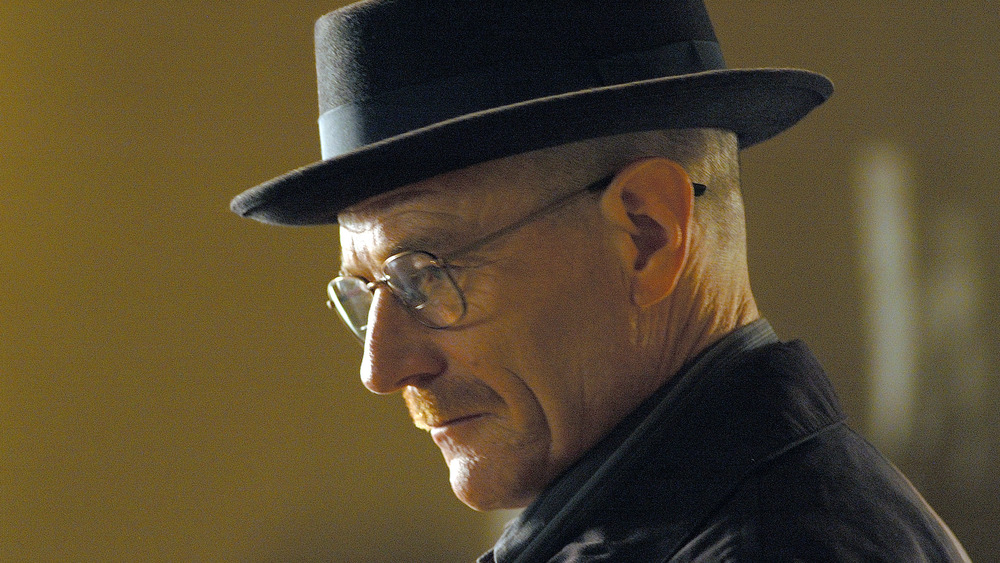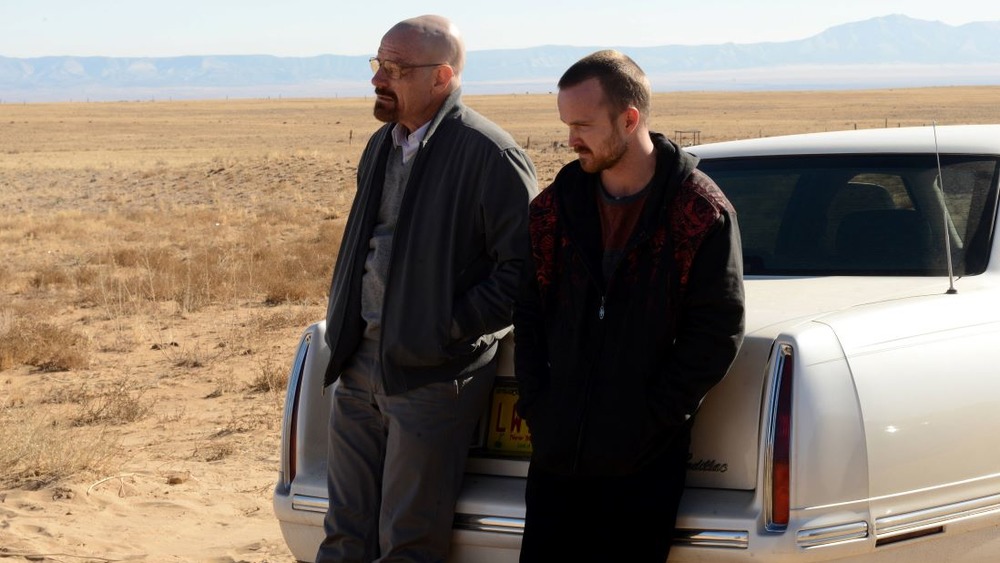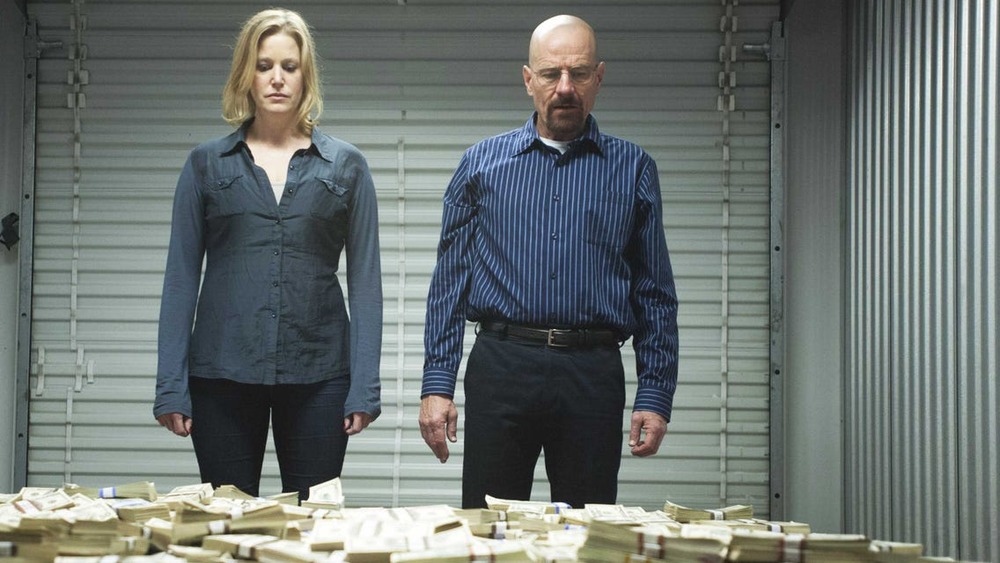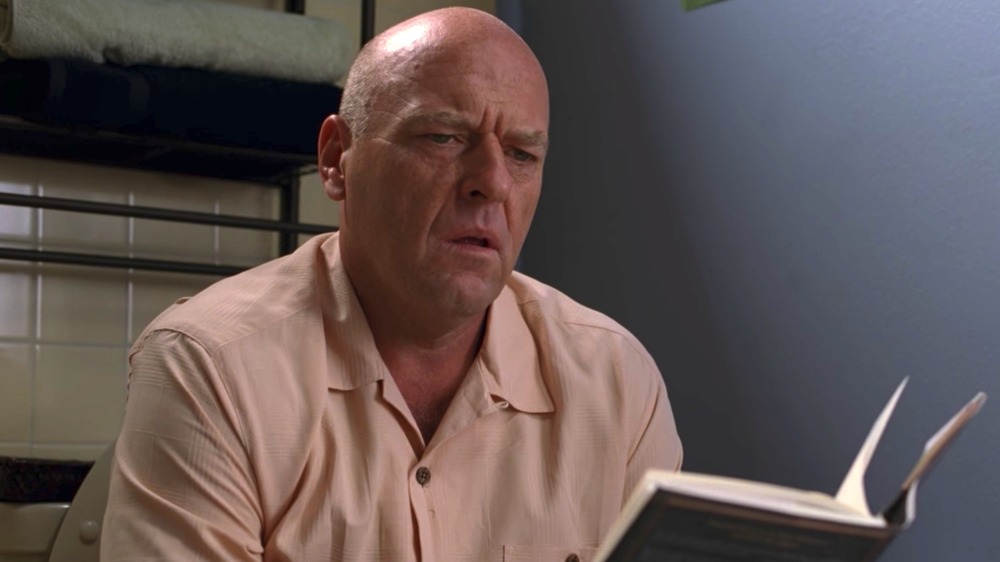This Was Walter White's Biggest Weakness In Breaking Bad
There are only about a thousand reasons why AMC's Breaking Bad is regarded by its fans to be perhaps the greatest hour-long TV drama of all time. They (and we) could go on at length about the series' crack writers, its positively sublime use of music, and of course, its cinematography, which was never anything less than stunning. But all of those elements wouldn't have jelled the way they did without an absurd amount of talent in front of the camera, and while Breaking Bad sported one of the finest ensemble casts to ever grace the small screen, it was the performance at its center that pushed the series into rarefied air.
We refer, of course, to the great Bryan Cranston's work as Walter White, the high school chemistry teacher and family man who slowly but surely morphs into Heisenberg, drug kingpin and terror of the Albuquerque underworld, after a terminal cancer diagnosis. Series creator Vince Gilligan famously had a tough time finding takers while pitching his "Mr. Chips becomes Scarface" premise to virtually every cable network in existence, but in Cranston, he found an actor singularly capable of giving us a grounded, sympathetic protagonist who somehow managed to keep us rooting for him even as he systematically abandoned every principle, alliance, and scruple he ever had.
Once Walter began his slow journey to the dark side, his eventual fate — bleeding out of a gunshot wound on the floor of a meth lab while police closed in — might have seemed inevitable. But for all the formidable enemies he made over the course of Breaking Bad's run, none were so formidable as Walter himself — a man whose bone-deep flaws were amplified by orders of magnitude once he got a taste of money, power, and notoriety.
Walter's desperate need for love and acceptance hurt him
As Breaking Bad opens, we quickly get the idea that Walter considers himself to be quite an underachiever. A bonafide genius with a genuine love of chemistry, he spends his days attempting ,without much success, to communicate that passion to throngs of achingly bored high school students. It's not that Walter doesn't love to teach — it's just that, as it's soon revealed, his life might have gone a dramatically different way. We come to learn that once upon a time, he was the co-founder of a company called Gray Matter with his friend Elliott (Adam Godley) and girlfriend Gretchen (Jessica Hecht), and that he had sold his share in that company for peanuts shortly before it became a roaring, multi-billion dollar success. To add insult to injury, Gretchen had ended up marrying Elliott — and while Walter's wife Skyler (Anna Gunn) and son Walter, Jr. (RJ Mitte) obviously adore him, Cranston expertly lets us in on Walter's inner conviction that even his loving family knows all too well that he could have been much more than a simple teacher.
After his diagnosis — and after a ride-along with his DEA agent brother in law Hank (Dean Norris) which illustrates for Walter just how lucrative the meth trade can be — Walter seeks out ex-student and meth cook Jesse Pinkman (Aaron Paul) with a proposition to partner up, so that he can provide a nest egg for his family after he's gone. In Jesse, Walter sees someone who will recognize and praise him for the genius he is — and who can help him attain the riches he feels he was cheated out of by his former business partners. Walter and Jesse's relationship, though, quickly turns into a ferociously codependent one, with each alternately inflating and tearing down the others' sense of self-worth.
Walter's unabashed greed didn't help him
This brings us to another major weakness of Walter's, one that seems to simply take over as the series progresses: His naked greed. In the season 2 episode "Seven Thirty Seven," Walter calculates that he needs (you guessed it) $737,000 to leave for his family before he'll check out of the meth trade. Later in the series, though, it becomes clear that any notion Walter ever had of stopping at a mere seven hundred grand and change has gone right out the window.
In the sixth episode of season 5, "Buyout," Walter, Jesse, and their reluctant partner Mike Ehrmentraut (Jonathan Banks) are offered $5 million apiece for the thousand gallons of methylamine they had secured by way of a train heist. Despite his earlier calculation (which Jesse, who wants to agree to the buyout, pointedly reminds him of), Walter refuses, knowing full well that the sum being offered represents a fraction of what he could make if he continues to cook.
In that same season's eighth episode, "Gliding Over All," Skyler — who by this time has become a begrudging accomplice in Walter's crimes, and had been laundering his money through a car wash the couple had purchased — brings Walter to a storage unit she had rented for the express purpose of storing the overflow. When Walter asks her how much the ginormous pile of money therein, roughly the size of a king-sized bed, amounts to, Skyler simply replies, "I have no earthly idea." A stunned Walter finally seems ready to hang up Heisenberg's porkpie hat at this point — but later in that same episode, his single most deadly weakness seals his fate.
Walter's pride led directly to his downfall
As money hungry as he was, Walter's pride at being the best meth cook in the business likely became an even stronger incentive to continue at some point — as evidenced by a dinner conversation he'd had with Hank in the season 4 episode "Shotgun." Hank had previously discussed with Walter the bizarre details of a case he'd been working: The killing of Gale Boetticher (David Costabile), a mild-mannered chemist and former co-worker of Walter whom Jesse had murdered, at Walter's behest, in order to save them both from their own demises at the hands of employer-turned-deadly enemy Gus Fring (Giancarlo Esposito).
Hank, who had been relentlessly pursuing Heisenberg, was convinced he'd found his man upon getting a look at the detailed plans for a meth superlab in the dead man's notebook, and during a family dinner, Hank was begrudgingly admiring Gale's genius — but Walter, drunk on both wine and his own hubris, simply could not keep his mouth shut. "You showed me that notebook, and from what I saw... genius? Not so much," he said. "To my eye, all this brilliance looks like nothing more than just simple rote copying, probably of someone else's work. Believe me, I have been around enough students to know. So, this genius of yours — maybe he's still out there."
That was all it took for Hank to regain interest in the case. Heck, Walter had even "cracked the code" that the "W.W." Gale mentioned in his journal was Walt Whitman, whose poetry had been scribbled in the margins. But at the end of "Gliding Over All," Hank happened to discover a book of Whitman's prose in Walter's bathroom, with a personalized inscription in Gale's handwriting — and finally, all at once, it clicked that the monster he'd been chasing was his own brother in law.
Of course, Hank would tragically miss out on bringing Walter to justice. But that single drunken slip-up, forced by his towering pride, was enough to ensure that although justice would never find Heisenberg, death soon would.



